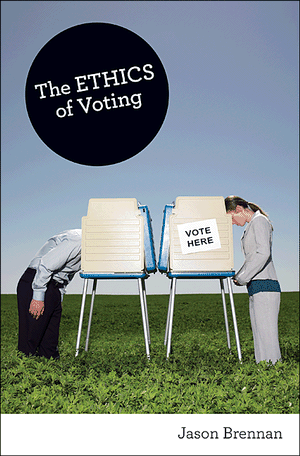When economists look at voting, they usually say that the benefit from voting is the probability that your vote will be the deciding vote in an election. Since no major political election in American history has been decided by one vote–or even by anything close to one vote–this means that the effective benefit of voting is basically zero.
And yet people vote. What’s more, we have an idea that people ought to vote, and that they probably should try to be moderately informed about it, too.
Jason Brennan is one philosopher who feels quite differently. His argument, in The Ethics of Voting, is that there’s no real civic duty to vote. If you’re uninformed, he argues, then your vote does more harm than good. And instead of spending the effort to become informed, why not spend the effort on some other socially beneficial activity? Start a business, found a charity, volunteer somewhere: but skip the voting.
Here’s the problem with that analysis, however. The term “more informed” is, by definition, relative. So if we say that only the most informed 50% of the electorate should vote (morally speaking, I’m not suggesting any kind of law or policy to disenfranchise ignorant people here), why stop there? Now instead of 200,000,000 voters you have 100,000,000 voters, but 50% of them are smarter than the other 50%, so shouldn’t we reduce the number again, to 50,000,000? The point is that there’s no good reason to ever stop this winnowing process until we end up with a world where only a handful of super-geniuses are voting and the rest of us are just sitting on the sidelines.
There are all kinds of problems with this approach. First: how do the dumb people know that they are too dumb to vote? “The best lack all conviction, while the worst. / Are full of passionate intensity,” as Yeats said. It seems impossible to implement.
Second, and much more importantly, however, is the problem of concentration of power. If you’ve got a handful of geniuses who are are entrusted with calling all the shots, then you’ve got a recipe for total corruption. Brennan’s argument, taking to its logical conclusion, calls for a nation of sheep who create their own wolves by ceding all political power to a privileged elite. Should we bother to pretend that this is a democracy?
Another problem with concentrated power is that you’re creating an unstable political system. When you have tens of millions of people voting the cost of any particular special interest seizing power is high because the power is so diffuse. But if we imagine this world where a handful of elites are the only ones to cast votes (and even if we pretend they are incorruptible), then what’s to stop some crazy, extremist group from turning out 100 followers to seize the election?
In other words, it may well be in the interests of individual citizens to vote simply to keep the aggregate level of voting high enough to ensure the stability of the system. Whether or not this theory actually explains individual incentives to vote is up in the air (I suspect it is not), but what I like about this perspective is that it shifts the emphasis from isolated individuals to society as a community.
This is a good introduction to my vision of society as an emergent property of a complex system. Emergence is a tricky concept and a bit of a scientific buzzword. In general, it refers to the idea that if you get a lot of independent entities interacting, together the group can create something new and unexpected that cannot be reduced to the properties of the individuals in the group. This might include natural phenomena (the weather or evolution), animal behavior (like a flock of birds or school of fish), or even laws of nature (classical physics can be seen as an emergent property of quantum mechanics). Most interestingly, however, F. A. Hayek’s pivotal “The Use of Knowledge in Society” can be seen as an argument (before the term “emergence” was widely recognized) that markets and the price system are an emergent property of human behavior.
The reason I like to think of society as a complex system is that it combines the best of individualism and collectivism while avoiding the worst excesses of each. It embraces the view (common to methodological individualism) that the individual agents is the essential logical and moral building block of social analysis, but it avoids the sickness of Ayn Rand’s repudiation of the value of interpersonal bonds and obligations. It includes the possibility that institutions mold individuals as well as the other way around (common to institutionalism) without forgetting that those institutions are, themselves, the consequence of individual human deliberation and action. It therefore avoids the totalitarian trap of forgetting that institutions exist of and for individuals, and not the other way around.
This perspective is the paradigm through which I view all social and political questions. From the interactions of individual human beings, societal institutions arise as emergent properties. Because these properties are difficult to explain by reduction to the constituent agents (I am claiming only weak, and not necessarily strong emergence), it makes sense to also talk about the impact that these emergent institutions have on people.
Sound complicated? Perhaps, but I think that I’m following Albert Einstein’s maxim that (in effect) that “Everything should be made as simple as possible, but no simpler.” The reality is that voter models that consider only individuals and not the collective community to which they belong don’t work. That model is broken, and it’s not the only important case where methodological individualism falls short. Bringing emergence into the equation will indeed complicate the models, but I think there is (in many cases) benefit that outweighs the cost. I also happen to think it’s much closer to the underlying reality.
In subsequent posts, I’m going to talk about the impact this perspective has on the harm-based theory of ethics and also on the simple question of why I bother to blog. Two more quick comments for now, however.
First, I am aware that an emphasis on collectivism may rub a lot of small-government conservatives, right-libertarians, and classical liberals the wrong way. In part, that cannot be helped. The reason that I’ve never been able to call myself a libertarian without qualification is simply that I think collectives–which is to say communities–matter. In addition, modern libertarianism often seems far more libertine than libertarian to me. It’s worth pointing out, however, that the 19th century intellectual ancestors of modern libertarianism well understood the twin extremes of collectivism and individualism. Both of these extremist viewpoint share a common tendency to obliterate the mediating institutions of society, which Burke called “little platoons”. Things like family, church, voluntary associations, independent educational institutions, etc. These thinkers understood that radical individualism would eventually devour itself like a snake eating its own tail and revert to tyranny of one kind or another.
Second, I’m also aware that many would argue that methodological individualism and new institutionalism are value-neutral, academic paradigms whereas I’ve assumed the first favors individualism and the second collectivism. I’m aware of the dispute, and I just happen to side with the critics in this case, who assert quite rightly that each carries implicit judgments embedded within.


I wrote about this somewhat on Election Day. Though I’m for those who are politically ignorant and *know* they are ignorant staying home.
http://theslowhunch.blogspot.com/2012/11/voting-how-i-did-and-why-i-nearly-didnt.html
Deciding who is ignorant, though, is another matter entirely.
I do believe in a bare minimum standard for voting. I think a decent standard would be simply to make everyone pass some version of the US citizenship test to vote. It’s a very controversial suggestion and I’m not really interested in picking a political fight over it, but if I had my druthers no one who couldn’t do things like “name the three branches of government” or “identify the current Chief Justice of the Supreme Court” or “name the Secretary of Defense” should be allowed to vote.
But my hope would be that people would educate themselves and vote, not that uneducated people would simply stop voting.